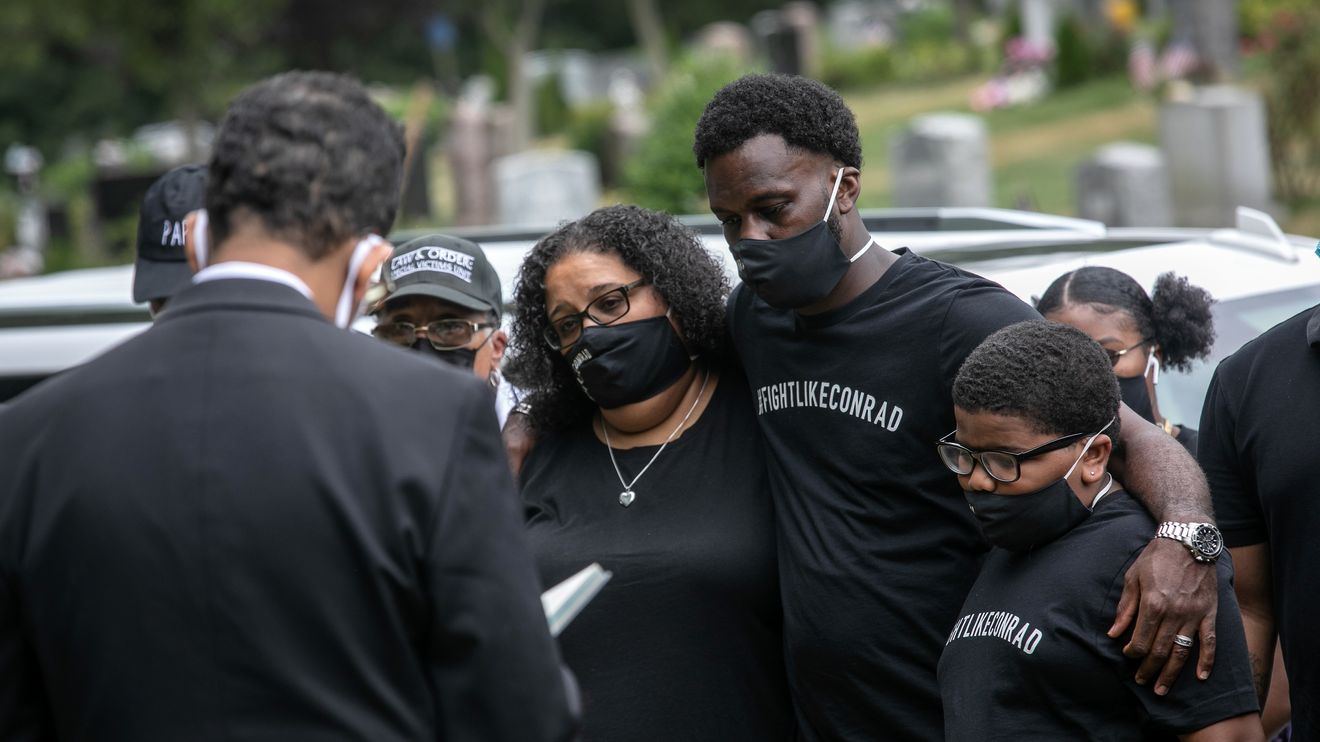
A new study on the number of children who have lost a caregiver to COVID-19 is the latest reminder that the pandemic’s impact will be felt for generations to come.
About 1 child loses a caregiver with every 4 deaths due to the coronavirus pandemic, according to a new study published in the peer-reviewed journal Pediatrics on Thursday by a team of international researchers, including members of the Centers for Disease Control and Prevention’s COVID response team.
“Children of racial and ethnic minorities accounted for 65% of those who lost a primary caregiver due to the pandemic,” the study found. The highest loss of primary caregivers for children took place in California, Texas and New York.
“‘Children of racial and ethnic minorities accounted for 65% of those who lost a primary caregiver due to the pandemic.’”
One out of every 168 American Indian/Alaska Native children experienced orphanhood or death of caregivers, 1 of every 310 Black children, 1 of every 412 Hispanic children, 1 of every 612 Asian children, and 1 of every 753 white children, the researchers concluded.
Overall, an estimated 142,637 children experienced the death of at least one parent, or a custodial or other co-residing grandparent caregiver — 120,630 of those children experienced the death of a primary caregiver.
“Children’s lives are permanently changed by the loss of a mother, father, or grandparent who provided their homes, basic needs, and care,” the authors wrote. “Loss of a parent is among the adverse childhood experiences linked to mental health problems; shorter schooling; lower self-esteem; sexual risk behaviors; and increased risk of substance abuse, suicide, violence, sexual abuse, and exploitation.”
“The magnitude of young people affected is a sobering reminder of the devastating impact of the past 18 months,” said Dr. Alexandra Blenkinsop, co-lead researcher, Imperial College London. “These findings really highlight those children who have been left most vulnerable by the pandemic, and where additional resources should be directed.”
“We often think of the impact of COVID-19 in terms of the number of lives claimed by the disease, but as this study shows, it is critical to also address the broader impact — both in terms of those who have died, and those who have been left behind,” added study co-author Charles A. Nelson III, who studies the effects of adversity on brain and behavioral development at Boston Children’s Hospital.
The analysis used mortality, fertility, and U.S. Census Bureau data to estimate COVID-19-associated orphanhood (death of one or both parents) and deaths of custodial and co-residing grandparents between April 1, 2020, and June 30, 2021.
“COVID-19-associated deaths” refers to the combination of deaths caused directly by the virus, and those caused indirectly by associated causes, including lockdowns, restrictions on mobility, reduced access or quality of health care and of treatment for chronic diseases, the authors said.
Worldwide
Worldwide, an estimated 1.5 million children across 21 countries lost a parent or grandparent who lived with them due to COVID-19 between March 2020 to April 2021, according to a separate study published in July.
The authors of the study, in the peer-reviewed The Lancet, arrived at that figure using mortality and fertility data to model rates of COVID-19 associated with the loss of a parent or secondary caregiver who lived with a child.
The study was funded in part by the National Institute on Drug Abuse, a branch of the National Institutes of Health. NIDA funded the research because of the close link between losing a parent or secondary caregiver and increased substance use as a result of heightened trauma levels.
“‘Orphanhood and caregiver deaths are a hidden pandemic resulting from COVID-19-associated deaths.’”
“Studies like this play a crucial role in illuminating the COVID-19 pandemic’s long-lasting consequences for families and the future mental health and wellbeing of children across the globe,” said NIDA Director Dr. Nora D. Volkow.
Children in South Africa, Peru, the United States, India, Brazil and Mexico lost the most primary caregivers from COVID-19. The authors of the second study defined a primary caregiver as a parent or a custodial grandparent.
“Orphanhood and caregiver deaths are a hidden pandemic resulting from COVID-19-associated deaths,” the study authors wrote. “Because COVID-19 can lead to death within weeks, families have little time to prepare children for the trauma they experience when a parent or caregiver dies.”
They added that the institutionalization of children who lose a parent, which the researchers said is a common response even when there is a surviving parent, “can result in developmental delays and elevated abuse.” Other long-term consequences include higher risks of experiencing mental health problems; physical, emotional, and sexual violence; and family poverty, the researchers said.
In every country, COVID-19 associated deaths were greater in men than women, particularly in middle- and older ages, the study reported, adding that “overall, there were up to five times more children who lost a father than who lost a mother.”
Even as more people get vaccinated around the world the pandemic is far from over, especially with the spread of the delta variant, which is responsible for some 83% of new cases in the U.S. currently, according to the U.S. Centers for Disease Control and Prevention Director Dr. Rochelle Walensky.
“[W]e must not forget that the pandemic continues to pose a threat to parents and caregivers — and their children,” said Charles Nelson, a co-author of the study and the director of research at the Developmental Medicine Center within Boston Children’s Hospital.
Globally, some 4.8 million people had died of COVID-19 as of Thursday, according to Johns Hopkins University data.
“We must ensure children who have lost a parent or caregiver have access to the support services they need, and that this additional impact of the COVID-19 pandemic is comprehensively addressed in both our rapid response and our overall public health response,” Charles A. Nelson III, co-author of the Pediatrics study, said.











